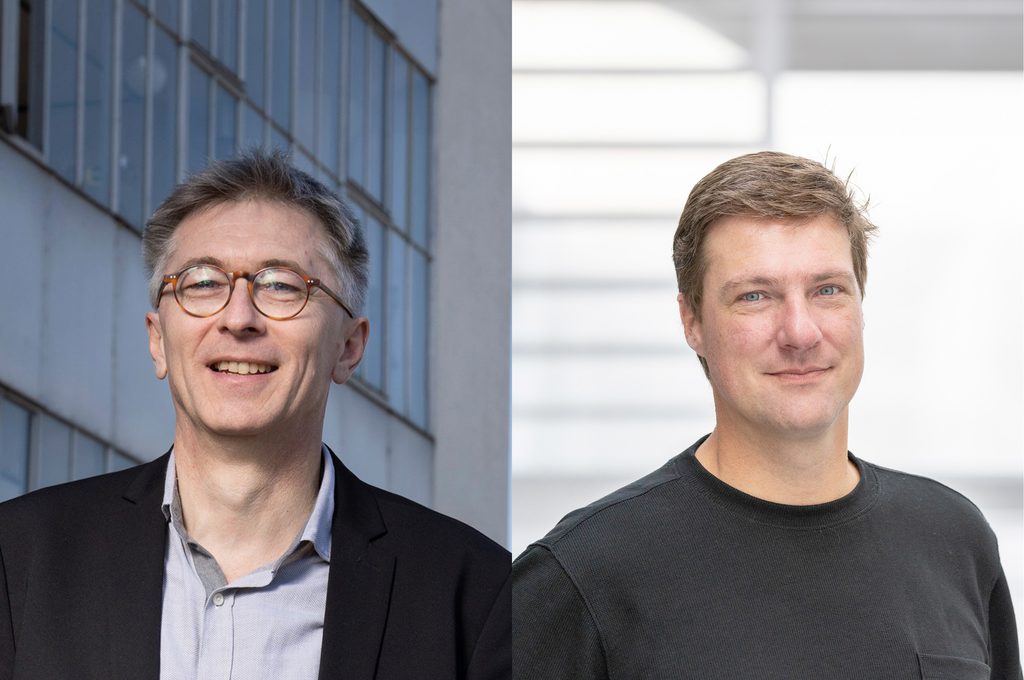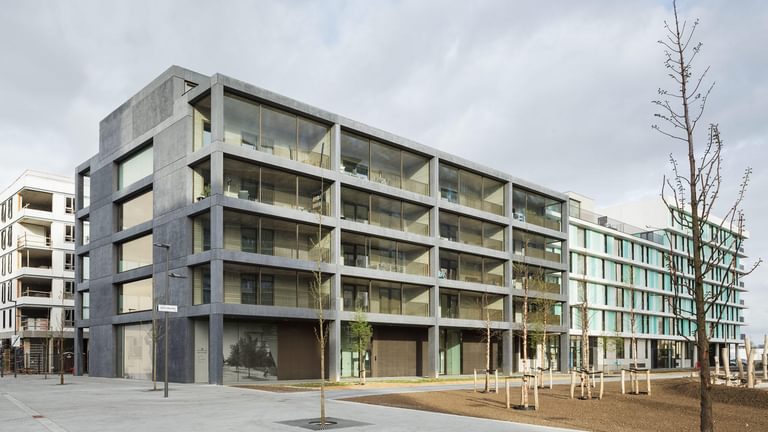Anyone working on assignments across borders inevitably encounters cultural differences. In the context of cepezed's 50th anniversary, Paddy Sieuwerts discusses this with André Kempe. Together with Oliver Thill, André founded Atelier Kempe Thill in Rotterdam in 2000. Both architects come from East Germany, which partly explains their interest in cultural differences.
Paddy: In the nineties, when it was not so common, cepezed did many projects abroad. For the past ten, twenty years, we mainly worked in the Netherlands. The last few years, we've been trying to get a foothold in Belgium, Germany and France. This proves to be quite difficult. It intrigues me that you came to the Netherlands from Germany with the idea of working internationally.
André: We came from East Germany, which is an important nuance. When we started our studies in Dresden in 1990, the wall had just fallen a year. The West Germans labelled us 'Ossies' as lazy and incompetent. In Dresden, the most uncultured developers went to work. The openness was not at all inspiring for us in that respect. That's why we left for the Netherlands. We considered Spain, the US and Switzerland, but found the ideas of Kees Christiaanse and Willem Neutelings interesting - we knew them from guest lectures at our university. The same applied to firms like OMA and, in another respect, cepezed. We started hitchhiking and backpacking, won Europan 5 with a plan for the Laan op Zuid, then qualified for two grants, and in 2000 founded Atelier Kempe Thill.
Paddy: We Dutch always think many things about German culture, whether meant to be funny or not. As a German in the Netherlands, you must have noticed cultural differences too.
André: That about the Dutch merchant mentality is simply true. We used this mercantile, the "on the front row for a dime", as inspiration for our designs by radicalising certain aspects. The Netherlands is also Calvinistic, which fits well with our architecture, which is quite dry. Dutch houses generally have large windows and Dutch people then even leave the curtains open. We drove that habit to the extreme by designing houses with very large windows, even in social housing.
Paddy: As an outsider, taking a cultural difference at face value is quite daring.
André: For us, such an approach is never a gimmick, but an integral part of an architectural strategy. And it requires empathy on our part to challenge clients. We also notice this in Belgium. For a flat block in Antwerp, we chose black architectural concrete, as the ultimate in the tactile character of Flemish architecture. Throughout the process, we thought it would be cut out, but it just kept going! Exporting architecture is not the trigger for Atelier Kempe Thill. We are interested in the cultural discussion we can have with the locals. Although, again, that conversation should not go too deep, because you have to be able to stand out.
Understanding Europe and making Europe


Paddy: We notice that it takes time to explore the ways of working in another country. We also make mistakes - for instance, I once introduced myself in Germany as Paddy instead of Herr Doktor Ingenieur Sieuwerts. I meant it as a rapprochement, but turned out to cause confusion. France in particular proved difficult for us. Have you had the same experience?
André: In the first place, you have to speak French; language is the key. You learn about cultural sensitivities through language. Such as the fact that sometimes the opposite is meant than is said. We actually enjoy those things.
Paddy: Like some kind of sport?
André: Yes, understanding Europe and making Europe... We are like a fish in water in the Netherlands, France, Germany, Belgium. We enjoyed Austria, but Switzerland was challenging. You think with a German-speaking country "it's your own language", but as with Flemish and Dutch, nuances are completely lost. Moreover, Switzerland is very chauvinistic. We don't like England or the US, due to the neoliberal winds blowing there.
Paddy: You work a lot in Belgium. Does the format of Open Oproep make it easy to get assignments?
André: Well no, Belgium was a closed clam for us and incredibly conservative. Until we won an Open Oproep once.
Paddy: How did it succeed that time?
André: Through connections, you need to have people who support you. Perhaps it is an advantage that we are German, we are not part of the animosity that is at play between the Dutch and the Flemish. We are the odd man out, watching with a naive eye. That naivety is harder for the Dutch and Flemish to hold onto. You have to pay attention to these kinds of sensitivities.
Paddy: Are you treated as Dutch architects in Germany?
André: When we were working on our project in Prora on the contrary, we were not. We were treated as locals there, who would know exactly how things work. We were put tremendously "through the mill". After that, we did nothing in Germany for eight years, until we were asked for projects in Hamburg, Mönchen Gladbach and Bremen. By now we are considered an authority, because of our professorship and perhaps just because of our grey hair. On the other hand, when you are taken so seriously, you have to be careful not to get carried away.

Paddy: Authority and position play more of a role in Germany than in the Netherlands.
André: But don't forget the Rudi Carrell effect! Even when he spoke German very well already, Carrell kept charmingly rehashing the language during performances. That charm, Germans lack, while being sensitive to it.
Paddy: Charming or not, the circularity that cepezed embodies seems to be a tricky subject in Germany. Also the "inventing by doing", which we embrace at cepezed, is not possible there.
André: Yes, there is a lot more emphasis on rules than here.
Paddy: In the Netherlands, testing twice when reusing, for example, hollow-core slabs is sufficient. In Germany, they test everything. Resulting in everything being broken.
André: They get in their own way with their normative way of thinking. If you compare Germany and France - both big countries - you see a world of difference. In France, things are also very formally regulated, but through a certain flexibility from time to time you can circumvent official regulations unofficially by building a personal relationship with people. The Netherlands and Belgium are also similar in size and yet very different. The Netherlands is all about institutions, while Belgium is like Italy, there you have to talk to people to a much greater extent to make room for a certain idea in a design.
Paddy: What does this result in?
André: When building a new apartment building in Antwerp, new columns were allowed here, but not there though, so we couldn't make a coherent plan. You then talk to someone in a certain position, to give that person an argument for exceptions. You have to "intrigue" otherwise you won't get anything done. Once you understand this, you have to play the game.

Paddy: cepezed owes its success in the Netherlands partly to the fact that we often come up with an answer to an unasked question. The appreciation for this also seems to be culturally determined.
André: Mm, you have to look at that on a situation-by-situation basis. In the Netherlands, it is certainly an asset if you propose something that no one expects. In Belgium we do it too, only there 'deviate' means half a meter instead of, say, turning a building a quarter turn or something like that. It's very nice about the Netherlands, that you can deviate so much. Although, since the 2010 crisis, this is also a bit of a thing of the past in my opinion.
Paddy: For a project in Halle, Saale, we proposed a beautiful staff room, which was not requested. Well that really wasn't the aim! We clearly think we have something unique, but seem to have to market it outside the Netherlands in a roundabout way. The same applies to our construction methodology.
André: Exactly, how do we get the specifics we have developed translated to another culture? We are also looking for that. We find that it's a fun search, because you can also communicate with the architecture itself. For example, by taking into account the 'praline mentality' in Flanders, and proposing beautiful, stony material. Or introducing a winter garden as a spatial buffer. In the Netherlands, in this quest, we ended up with the ultimate terraced house. We see it as a cultural adventure. Cultural differences challenge you to get out of your comfort zone. That leads to freshness.
Paddy: There is still a lot to learn when I hear you talk like this about assignments abroad. You strongly turn the notion of cultural differences, which you automatically have as a foreigner in the Netherlands, to your advantage.
André: I think the most important thing is to follow your instincts and stay curious
This conversation between Paddy Sieuwerts and André Kempe took place in the context of cepezed's 50th anniversary.
→ Mail bd@cepezed.nl or call our business development team on +31 (0)15 2150000